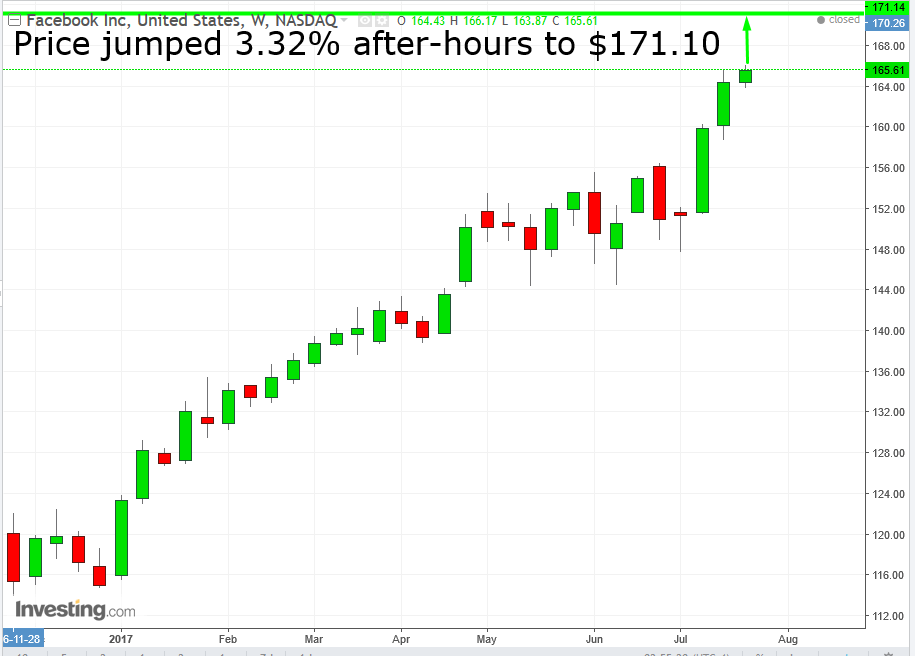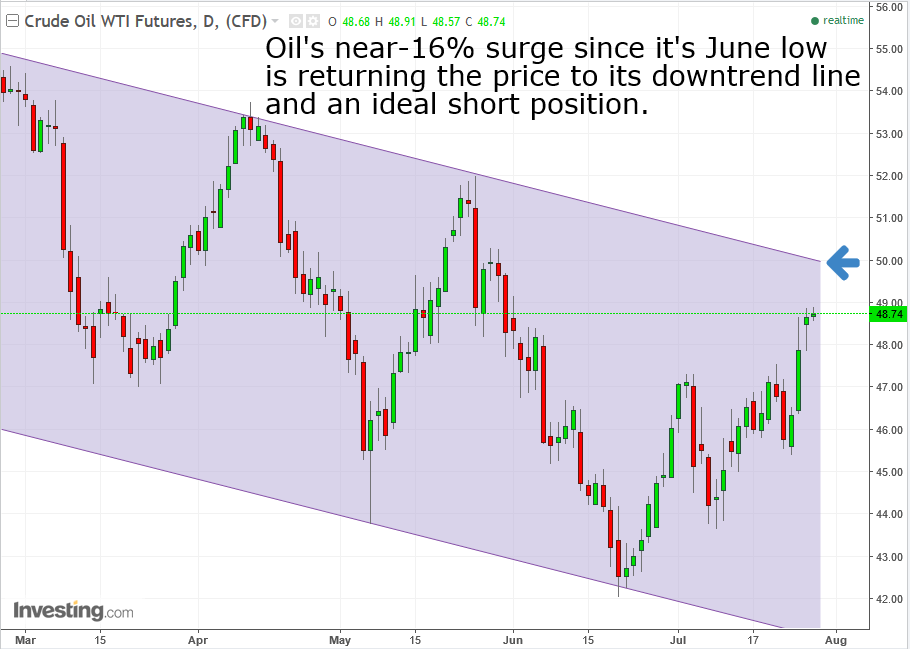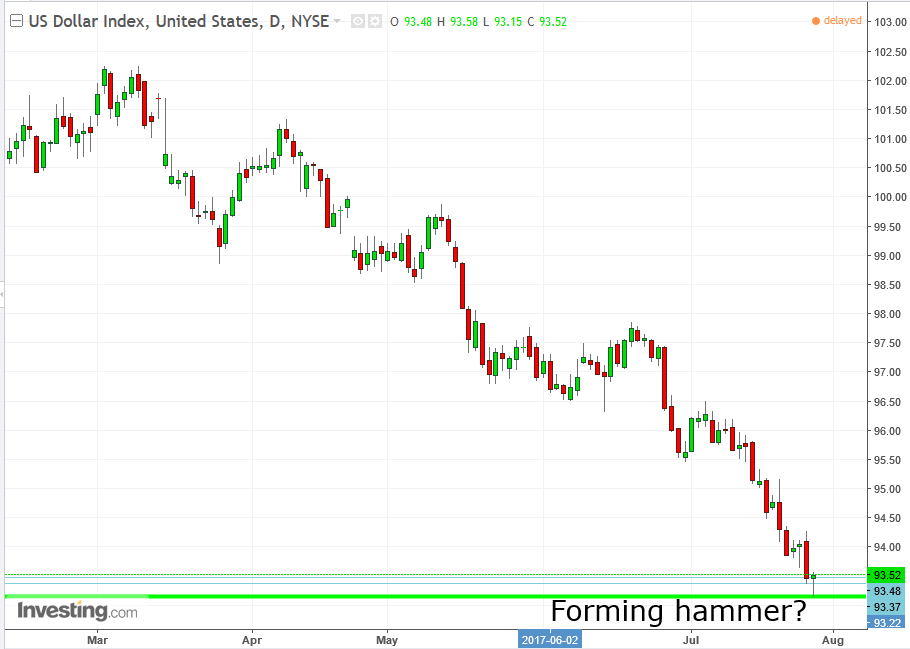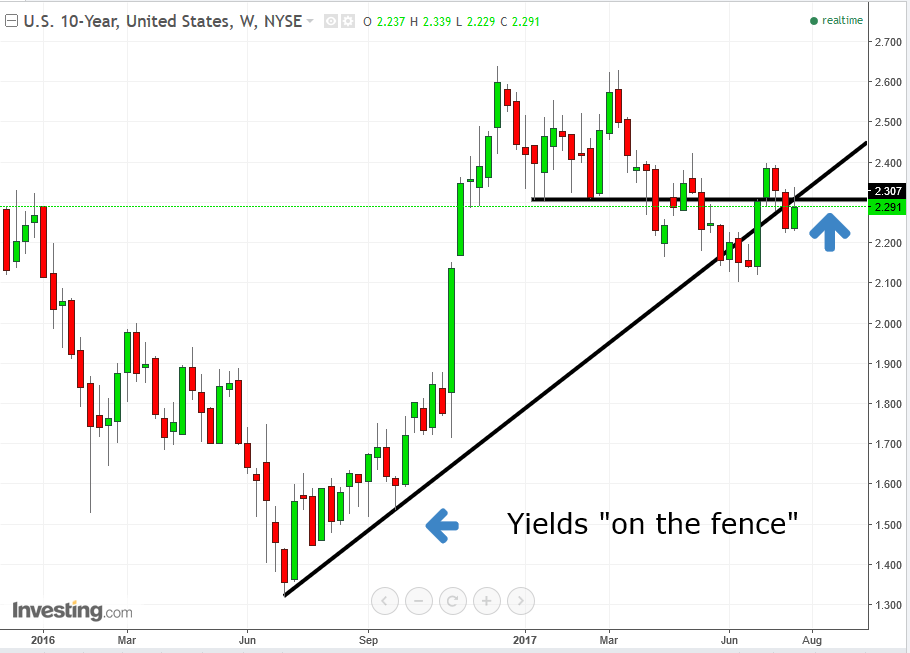by Pinchas Cohen
Global Affairs
Yesterday’s Close
Investors sold the dollar and bought up Treasuries after the FOMC reiterated—again—that inflation remains below its (by-now clichéd) 2 percent target. The dollar declined to its lowest level since June 23, 2016, the day of the Brexit vote, and the US currency closed at its lowest level since May 4 of that year.
It seems that the larger the number of stocks used to calculate an index's average, the less it's able to carry its own weight. While the S&P 500 scratched out a 70-point gain, and the smaller NASDAQ 100 advanced 0.33-percent, it was the Dow Jones Industrial Average, with just 30 stocks in its average, that achieved the biggest gain, up 0.45 percent. Breadth corresponded to the same structure: only the S&P 500 Advance/Decline line pointed straight down, while the Dow Jones and the NASDAQ 100 A/D were flat.
The S&P 500 actually registered gains throughout the trading session—at 0.18 percent, less than its counterparts—but lost them during the last 15 minutes of trading. Meanwhile earnings beats from AT&T (NYSE:T) to Boeing (NYSE:BA) drove other indexes higher.

After reporting earnings, Facebook (NASDAQ:FB) jumped 3.32 percent from the $165.61, closing at $171.10 in after-hours trading.
Breaking Down Facebook’s Second-Quarter Earnings
Facebook achieved over 40 percent YoY revenue growth. Its Monthly Active Users hit 2 billion, bringing it up 17 percent YoY, despite it already having a large base. Its ad revenue is up 40 percent YoY. As well, Facebook announced it has 15 million business profiles on Instagram, on top of its 70 million business pages on Facebook.
Estimates from eMarketer forecast Instagram will bring in $3.97 billion in ad-revenue this year. That’s about four times as much as Snapchat altogether (NYSE:SNAP). Instagram is proving to be a business and user success story due to its very addictive platform. Users 25 and younger spend considerable time on it, with multiple accounts, and Facebook managed to visually integrate Instagram ads in a natural way, making them look like a part of the platform. COO Sheryl Sandberg told Bloomberg the company made these achievements, as they “increased engagement and increased ability to work with marketers, so that they could reach their audience.”
Market Reaction Breakdown to Fed Announcement
The 10-year Treasury yield extended its losses, after the Fed kept rates unchanged and signaled it would start unwinding its balance sheet “relatively soon.” A slower path of interest rates makes today’s yields proportionately more attractive, and unwinding the balance sheet with a higher supply of sovereign bonds would further reduce yields, making today's bonds more attractive.
So, why did investors sell dollars after the FOMC announcement? It was consensus that rates will be left unchanged and that the balance sheet will unwind “fairly soon?”
Moreover, if dollar investors increased their bearish outlook of the US economy, why did stocks keep their gains, and even resume their advance?
This apparent dichotomy is in the market structure breakdown, where dollar and bond investors are bearish on the economy, while equity investors remain bullish. Once again, we see that currency and bond traders are sensitive to political and economic developments, while the views of equity traders are narrowly focused on profits—both their own and those of the companies in which they invest.
The Fed decision diverted equity traders from corporate earnings, during a season in which more than 80 percent of S&P 500 companies beat earnings forecasts. These beats boosted optimism in the global economy, pushing volatility to record lows—in stark contrast to actual economic data this year, as well as to the Fed's tempered rhetoric.
Oil
Oil climbed above $48 a barrel, surging to an eight-week high, after the EIA reported that US stockpiles fell to levels which have not been seen since the start of the year. Investors were hoping for an industry drawdown, and the commodity's price reflected that.

After oil reached its June 19, $42.05 low, it recovered on rising demand for gasoline during the summer driving season, which has been depleting stockpiles. The key factor for investors to focus on remains the bigger picture: prices have been stuck below $50 since May on the rising global output from Libya, Nigeria, and the US.
In OPEC’s last meeting, in which it promised to deepen its cuts, Libya and Nigeria remained exempt, and both intend to increase production. The US has been increasing its production as well—offsetting OPEC and NOPEC cuts—driving prices lower, as it is able to turn a profit on lower prices per barrel than it is used to both due to efficiency and hedging. Most reports have claimed that hedging allows US producers to profit, even if oil prices were to sink to as low as $20 a barrel, while some recent reports claimed that when current hedging contracts run out, producers will be forced to cut production.
Today’s Open
Investor distraction from the FOMC meeting evaporated overnight, as the dollar and 10-year Treasury yields recovered and extended gains, with Asian stocks rising on optimism from corporate earnings, while European equities fluctuated.

Bond traders’ attention remains fixated on the Fed, as the 10-year Treasury yield extended losses after the FOMC. The Dollar Index initially extended declines to its lowest level since June 23, 2016, but has since recovered, forming a bullish hammer.
The MSCI Asia Pacific Index advanced to its highest point since December 2007, on Samsung Electronics (KS:005930) and Nintendo (T:7974) beating earnings expectations. However, the Stoxx Europe 600 has been fluctuating between varying results from corporate heavyweights. Particularly disappointing was Deutsche Bank (DE:DBKGn), Europe’s largest investment bank, which reported a 10-percent decline in second quarter revenue, and Nestle (SIX:NESN) which warned that sales growth this year will be the weakest in at least two decades.
Market Moves
Currencies
- The Dollar Spot Index fell 0.1 percent as of 8:12 a.m. in London, after falling 0.6 percent on Wednesday.
- The yen traded at 111.24 per dollar, down 0.1 percent after erasing an earlier gain.
- The South Korean won jumped 0.8 percent.
- The euro fell 0.1 percent to $1.1723, after a 0.8 percent advance on Wednesday sent the currency to a 30-month high.
- The British pound rose 0.1 percent after climbing 0.7 percent in the previous session.
- The Aussie extended gains above 80 U.S. cents, rising 0.4 percent to its highest level since May 2015, after jumping 0.9 percent Wednesday. It slid below 79 cents during local trading on Wednesday following weaker-than-expected Australian inflation data and a speech by the nation’s central bank governor Philip Lowe.
Stocks
- The Stoxx Europe 600 was flat. Nestle slumped 1.8 percent and Deutsche Bank lost 2.9 percent. AstraZeneca (LON:AZN) tumbled 15 percent after the drug maker suffered a blow to its next-generation cancer therapy.
- Japan’s TOPIX rose 0.4 percent.
- Australia’s S&P/ASX 200 Index added 0.2 percent.
- South Korea’s KOSPI climbed 0.4 percent.
- Hong Kong's Hang Seng Index added 0.8 percent.
- China's Shanghai Composite increased 0.1 percent.
- The Dow Jones Industrial Average rose above 21,700 for the first time on Wednesday.
- NASDAQ 100 Futures climbed 0.6 percent. Facebook rose 3.4 percent in after-hours US trading after the company reported faster-than-expected sales growth.
Bonds

- The yield on 10-year Treasuries was at 2.28 percent, down less than one basis point after declining five basis points in the wake of the Fed statement from the previous session.
- French, German and UK 10-year yields lost four basis points.
- Australian government notes with a similar maturity saw yields fall four basis points to 2.69 percent, erasing Thursday’s gain of four basis points.
Commodities
- Gold rose 0.1 percent, to $1,262.19 an ounce, after climbing 0.8 percent in the prior session.
- West Texas Intermediate crude rose 0.3 percent to $48.91 a barrel, heading for a fourth consecutive day of gains.
- The Bloomberg Commodity Index advanced 0.4 percent, after climbing 0.7 percent on Wednesday.
